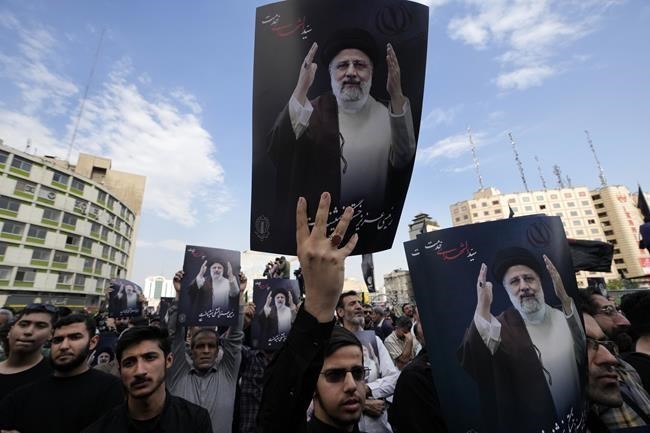HALIFAX — Members of a Canadian group representing families of those killed when Iran's military shot down a commercial jetliner in 2020 say the death of Iran's president means he will never face justice for his alleged role in their loved ones' deaths.
Meanwhile, Prime Minister Justin Trudeau is hoping for stability in the region and democracy for Iranians, without saying whether Ottawa has reached out to Iran.
President Ebrahim Raisi and Iran's foreign minister were found dead Monday, hours after their helicopter crashed in fog. Iran has offered no cause for the crash nor suggested sabotage brought down the helicopter, which fell in mountainous terrain in the country's northwest.
Kouroush Doustshenas, whose fiancée was among the 176 people killed when Flight PS752 was shot down on Jan. 8, 2020, said in an interview Monday that Raisi played a role in keeping skies open to civilian aviation as tensions flared in the region just before the plane was hit with missiles.
Fifty-five Canadian citizens and 30 permanent residents were among the 176 people killed on the Ukrainian International Airlines flight that was shot down by Iran's Revolutionary Guard shortly after takeoff from Tehran’s Imam Khomeini Airport.
Doustshenas said Raisi, known to many as the “butcher of Tehran," was also tied to the 1998 mass killings of peaceful protesters, the 2019 Bloody November massacres, and a vicious crackdown on the Woman, Life, Freedom movement that began in September 2022.
"Within days he is going to be replaced with another hardliner. And same with the Iranian foreign minister, he is going to be very soon replaced with another person who has the same record as he had of four decades of serving the same system," Doustshenas said in an interview from Winnipeg.
"So I didn't feel any happiness that he is dead, or anger," because the deaths will likely have no impact on the Iranian regime, Doustshenas said.
Canada's main focus is securing democracy for those living under violent oppression in Iran, and less conflict in the region, Trudeau said at an unrelated press conference in Philadelphia on Tuesday.
"Obviously, what we all want to see is regional stability at this particular moment," he said.
"There are significant tensions in the Middle East, that mean that any uncertainties need to be smoothed over."
Iranian advocates testified to the House subcommittee on human rights Tuesday, and urged Canada to do more to punish the regime in Iran.
Nazanin Afshin-Jam said Canada should lead other rich countries in crafting a strategic plan to weaken the regime and end "gender apartheid" in the country, similar to Ottawa's role in helping end South African apartheid.
She also warned that Iran poses a threat to those living in the diaspora in Canada.
"We can't risk not having a strong Iran policy; we are not safe," she testified.
Raisi, 63, had been discussed as a possible successor for Iran's supreme leader, the 85-year-old Ayatollah Ali Khamenei. His death now throws the succession into question, particularly as there is no heir-apparent cleric for the presidency ahead of planned June 28 elections.
In a statement Monday, the Association of Flight PS752 Victims said, “We vehemently sought to bring (Raisi) to justice for his crimes in a fair trial so that he could face the consequences of his heinous actions. We feel that we are robbed of such an opportunity, but we are not sorry about his death."
Across Iran, the rural population often more closely embraces the Shiite faith and the government. However, Tehran has long held a far different view of Raisi and his government's policies as mass protests have roiled the capital for years.
The most recent involved the 2022 death of Mahsa Amini, a woman detained over her allegedly loose headscarf, or hijab. The months-long security crackdown that followed the demonstrations killed more than 500 people and saw more than 22,000 detained. In March, a United Nations investigative panel found that Iran was responsible for the “physical violence” that led to Amini’s death.
This report by The Canadian Press was first published May 21, 2024.
— With files from Dylan Robertson in Ottawa and The Associated Press
Lyndsay Armstrong, The Canadian Press



